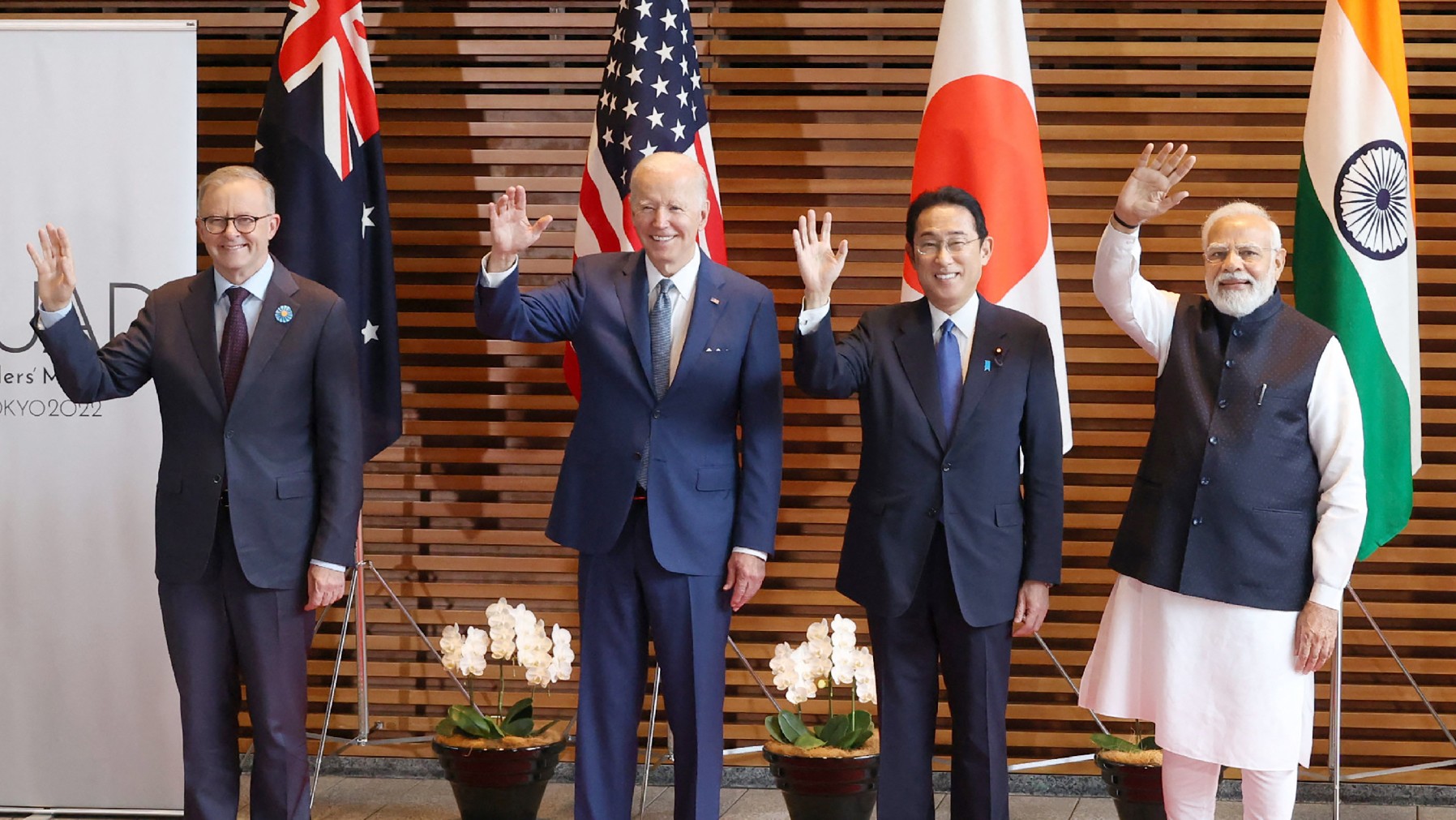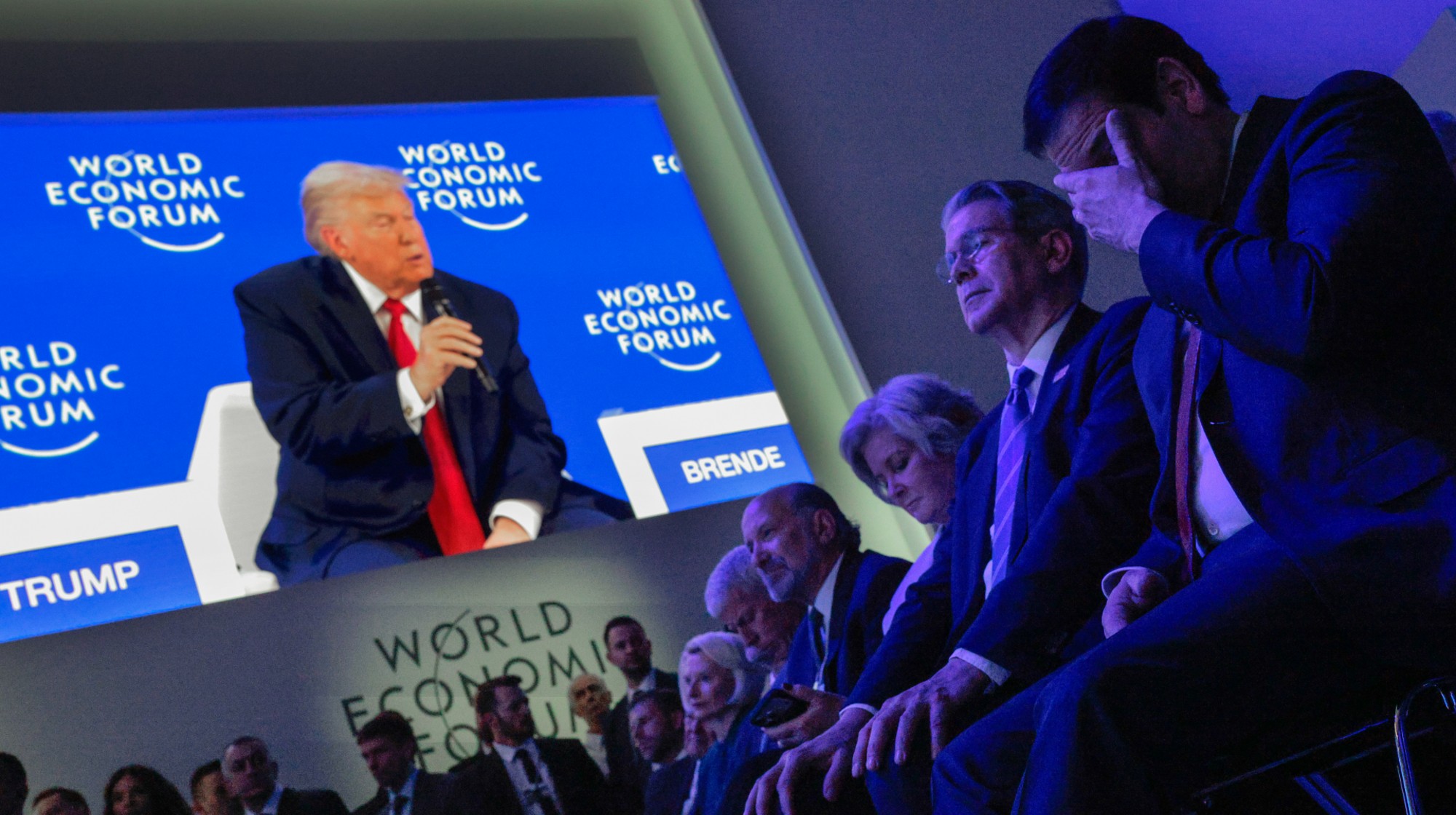The Quad: the origins of the Quadrilateral Security Dialogue
US, Japan, Australia and India accused of trying to form ‘Asian Nato’

A free daily email with the biggest news stories of the day – and the best features from TheWeek.com
You are now subscribed
Your newsletter sign-up was successful
The leaders of the US, Japan, Australia and India yesterday pledged to be “a force for good” in a “free and open Indo-Pacific” following a meeting in Tokyo of the so-called Quad.
In a joint statement, US President Joe Biden and prime ministers Fumio Kishida, Narendra Modi and Australia’s newly elected leader Anthony Albanese said the Quad was “committed to bringing tangible benefits to the region” at a time of profound global challenges.
But according to Reuters, the Ukraine invasion is “an issue that has risked division among the group”, as India, which has close ties with the Kremlin, resists calls to condemn Moscow’s war.
The Week
Escape your echo chamber. Get the facts behind the news, plus analysis from multiple perspectives.

Sign up for The Week's Free Newsletters
From our morning news briefing to a weekly Good News Newsletter, get the best of The Week delivered directly to your inbox.
From our morning news briefing to a weekly Good News Newsletter, get the best of The Week delivered directly to your inbox.
What is the Quad and how did it start?
Formally known as the Quadrilateral Security Dialogue, the Quad began as a loose partnership after the Indian ocean tsunami in 2004, when US, Japan, Australia and India joined together to provide humanitarian and disaster assistance.
But the group was disbanded just days later and the four nations joined broader relief efforts coordinated by the UN.
Why was it resurrected...?
In 2007, Japan’s then PM Shinzo Abe “suggested a more formal meeting of the four nations”, said USA Today.
The Quad duly gathered that May during the Association of Southeast Asian Nations Regional Forum in the Philippines. According to the Washington D.C.-based Center for Strategic and International Studies (CSIS), the meeting “was characterised as an ‘informal grouping’ that touched on areas of common interest”.
A free daily email with the biggest news stories of the day – and the best features from TheWeek.com
The political union triggered alarm in China. The BBC reported that “a deeply concerned Beijing” had “sent formal protests to the four governments”.
Amid “unclear objectives and mounting Chinese pressure”, said USA Today, “Australia, India and the United States hesitated to formalise the dialogue”.
The sudden resignation of Abe in September 2007 then eliminated what the CSIS described as the Quad’s “main cheerleader and architect”.
… and then revived once more?
The Quad was formally resurrected in 2017, amid alarm over China’s growing regional influence.
“Both the Trump and Biden administrations saw the Quad as key to a pivot towards placing more focus on the Indo-Pacific region, particularly as a counterweight to China’s assertive actions,” according to the Associated Press. The first formal Quad summit was held in 2021 and the member nations’ leaders met again virtually in March this year.
The Quad’s goal “is to keep military and political influence out of the critical water routes in the Indo-Pacific”, said India-based site News9Live, and to “maintain a worldwide order based on norms, as well as freedom of navigation and a free trading system”.
The alliance also aims to provide alternative debt financing to countries in the Indo-Pacific.
What does the future hold?
“Over the years, the Quad’s diplomacy has waxed and waned,” said the Council on Foreign Relations.
Following this week’s meeting, the four nations unveiled a maritime initiative to combat illegal fishing, and pledged to invest more than $50bn in developing infrastructure in the Indo-Pacific as part of their push to counter China’s growing influence in the region.
China has shot back by describing the group as an “Asian Nato”. Although the four nations have not made a mutual-defence pact, the grouping is intended to deepen military, economic and diplomatic ties.
“And while they don’t often explicitly say it, those partnerships are meant to be a bulwark against Chinese aggression,” said Delhi-based news site livemint.com.
Beijing and some Indian nationalists and leftists argue that Asian security should be moulded by Asian powers alone.
As global tensions grow, South Korea has expressed interest in joining the Quad, “though US officials have said they are not contemplating adjusting the group’s membership”, the site added.
But South Korea, New Zealand and Vietnam have been included in “Quad-plus” meetings “which could form the basis for future expansion or partnership in the region”.
-
 How the FCC’s ‘equal time’ rule works
How the FCC’s ‘equal time’ rule worksIn the Spotlight The law is at the heart of the Colbert-CBS conflict
-
 What is the endgame in the DHS shutdown?
What is the endgame in the DHS shutdown?Today’s Big Question Democrats want to rein in ICE’s immigration crackdown
-
 ‘Poor time management isn’t just an inconvenience’
‘Poor time management isn’t just an inconvenience’Instant Opinion Opinion, comment and editorials of the day
-
 Epstein files topple law CEO, roil UK government
Epstein files topple law CEO, roil UK governmentSpeed Read Peter Mandelson, Britain’s former ambassador to the US, is caught up in the scandal
-
 Iran and US prepare to meet after skirmishes
Iran and US prepare to meet after skirmishesSpeed Read The incident comes amid heightened tensions in the Middle East
-
 Israel retrieves final hostage’s body from Gaza
Israel retrieves final hostage’s body from GazaSpeed Read The 24-year-old police officer was killed during the initial Hamas attack
-
 China’s Xi targets top general in growing purge
China’s Xi targets top general in growing purgeSpeed Read Zhang Youxia is being investigated over ‘grave violations’ of the law
-
 Panama and Canada are negotiating over a crucial copper mine
Panama and Canada are negotiating over a crucial copper mineIn the Spotlight Panama is set to make a final decision on the mine this summer
-
 Trump backs off Greenland threats, declares ‘deal’
Trump backs off Greenland threats, declares ‘deal’Speed Read Trump and NATO have ‘formed the framework for a future deal,’ the president claimed
-
 Why Greenland’s natural resources are nearly impossible to mine
Why Greenland’s natural resources are nearly impossible to mineThe Explainer The country’s natural landscape makes the task extremely difficult
-
 Iran cuts internet as protests escalate
Iran cuts internet as protests escalateSpeed Reada Government buildings across the country have been set on fire